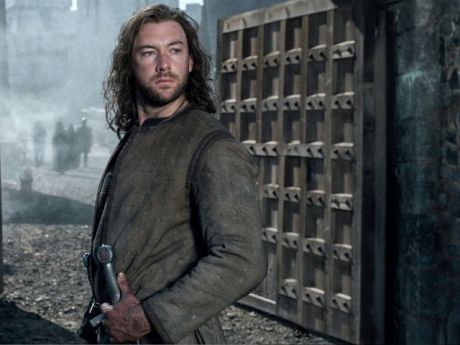Arts
You are here
New TV show sides with the peasants

September 30, 2015
Review of Bastard Executioner, on the FX network
Kurt Sutter, who has previously made TV series such as The Shield and Sons of Anarchy has created a new series, The Bastard Executioner this time set in 14th century Wales.
British imperialism is nothing new, but even in the United Kingdom, the struggle for Welsh national identity is often overshadowed by the years of The Troubles in Northern Ireland and the more parliamentary approaches for national sovereignty in Scotland. In this series premier we see the brutal repression felt by Welsh peasants under the British crown. They are taxed high, underpaid for their work, and live in wretched conditions compared to the nobility. The English robbed them of their language and culture, as we would see them do to many other peoples all over the world.
Story
The series follows the main character, Wilkin Brattle, a soldier who we learn was left to die at the hands of the Scots after being left behind by his Baron. In his dreams he is visited by an angel on that battlefield who gives him a mission. Religious visions frequently inspired Peasant rebellions in medieval Europe.
One night, Wilkin and some men return to their small village only to find that their houses have been burned and the women and children of the village have been murdered. This is retaliation by the Baron to a rebellion from a group of peasants against an increase in an already high tax. Since taxes were collected in goods and agricultural produce, the increases put the villagers in danger of starvation over the winter.
“Make this a sight, for deep memory, brutal, and a strike of pain that cannot be hidden,” says one of the English soldiers after a son is killed in front of his mother. Minutes later the English destroy the village. It shows the English heavy handedness and willingness to use brute force to enforce their supremacy.
Being pushed to their limits, the Welsh peasants decide to strike back. The small number of men from one village have no chance against the Baron and his soldiers, but with solidarity from peasants across the baron's lands they outnumber his forces. After a fierce battle, the peasants outnumbering the English, get their revenge. The premier ends with Brattle riding into the Baron's castle disguised as one of the men seeking to punish the Welsh peasants responsible for the rebellion, gaining the trust of the nobility.
Politics
The show displays very clear class antagonisms: with the wealth centered with the elite and the peasant just able to get by, it is easy to see how rebellion can break out. It also shows the strong patriarchy in society, where women are killed mercilessly and men are expected to fight to demonstrate bravery and domination. We also see the positive and negative sides of nationalism, one nation trying to assert itself, and another trying to dominate that struggling and exploited nation. This is an example of an underrepresented part of British imperial history with familiar results of one nation suppressing another. This will be interesting to anyone interested in European colonial history.
One disappointing aspect of the premier, that it shares with creator's previous show about motorcycle gangs, Sons of Anarchy, is that it's all about men. Like the previous series it looks like the story will be about men bonding in a violent world. Unfortunately, the writers have decided there is little room for women in this scenario.
Section:
Topics:









